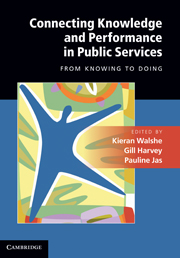Book contents
- Frontmatter
- Contents
- List of figures
- List of tables
- List of boxes
- Notes on contributors
- Foreword
- 1 Introduction: knowledge and performance – theory and practice
- 2 Knowledge from inspection: external oversight and information to improve performance
- 3 How is information used to improve performance in the public sector? Exploring the dynamics of performance information
- 4 Citizens, users or consumers: the voice of the public and its influence on improving performance
- 5 Competition and choice: the place of markets in connecting information and performance improvement
- 6 The role of corporate governance and boards in organisational performance
- 7 Change at the top: connecting political and managerial transitions with performance
- 8 The role of leadership in knowledge creation and transfer for organisational learning and improvement
- 9 Process Improvement and Lean Thinking: using knowledge and information to improve performance
- 10 Using evidence: how social research could be better used to improve public service performance
- 11 Absorptive capacity: how organisations assimilate and apply knowledge to improve performance
- 12 Knowing through doing: unleashing latent dynamic capabilities in the public sector
- 13 Conclusions: a puzzle, three pieces, many theories and a problem
- Index
- References
8 - The role of leadership in knowledge creation and transfer for organisational learning and improvement
Published online by Cambridge University Press: 05 July 2011
- Frontmatter
- Contents
- List of figures
- List of tables
- List of boxes
- Notes on contributors
- Foreword
- 1 Introduction: knowledge and performance – theory and practice
- 2 Knowledge from inspection: external oversight and information to improve performance
- 3 How is information used to improve performance in the public sector? Exploring the dynamics of performance information
- 4 Citizens, users or consumers: the voice of the public and its influence on improving performance
- 5 Competition and choice: the place of markets in connecting information and performance improvement
- 6 The role of corporate governance and boards in organisational performance
- 7 Change at the top: connecting political and managerial transitions with performance
- 8 The role of leadership in knowledge creation and transfer for organisational learning and improvement
- 9 Process Improvement and Lean Thinking: using knowledge and information to improve performance
- 10 Using evidence: how social research could be better used to improve public service performance
- 11 Absorptive capacity: how organisations assimilate and apply knowledge to improve performance
- 12 Knowing through doing: unleashing latent dynamic capabilities in the public sector
- 13 Conclusions: a puzzle, three pieces, many theories and a problem
- Index
- References
Summary
Introduction
Over the last decade, there has been renewed interest in leadership as a means to achieve organisational performance, across both public and private sectors (e.g. Hartley and Allison 2000; Storey 2004; Parry and Bryman 2006). In the public sector, leadership has been almost a mantra but without clear evidence (Hartley 2010). There are three issues which need addressing in order to understand whether and how leadership contributes to public service improvement. First, leadership is a multifaceted concept and so it is important to be clear about the term. Second, the evidence of a relationship between leadership and organisational performance is more often asserted than demonstrated and so evidence is needed which examines both leadership and improvement. Third, there is a need to better understand the dynamics of how leadership may have an impact on performance (as well as how performance may influence perceptions of leadership).
In understanding how leadership has an impact on improvement, this chapter examines how leadership fosters and sustains knowledge creation and transfer through organisational and inter-organisational learning. The value of organisational knowledge for creating strategic advantage in firms is well established (Nahapiet and Ghoshal 1988; Nonaka 1994), but its importance for public organisations has been underemphasised in both the policy and academic literature until recently. Since then, research has been undertaken in healthcare (Bate and Robert 2002; Nicolini et al. 2008) and in local government (Rashman and Hartley 2002; Hartley and Benington 2006).
Information
- Type
- Chapter
- Information
- Connecting Knowledge and Performance in Public ServicesFrom Knowing to Doing, pp. 145 - 172Publisher: Cambridge University PressPrint publication year: 2010
References
Accessibility standard: Unknown
Why this information is here
This section outlines the accessibility features of this content - including support for screen readers, full keyboard navigation and high-contrast display options. This may not be relevant for you.Accessibility Information
- 5
- Cited by
